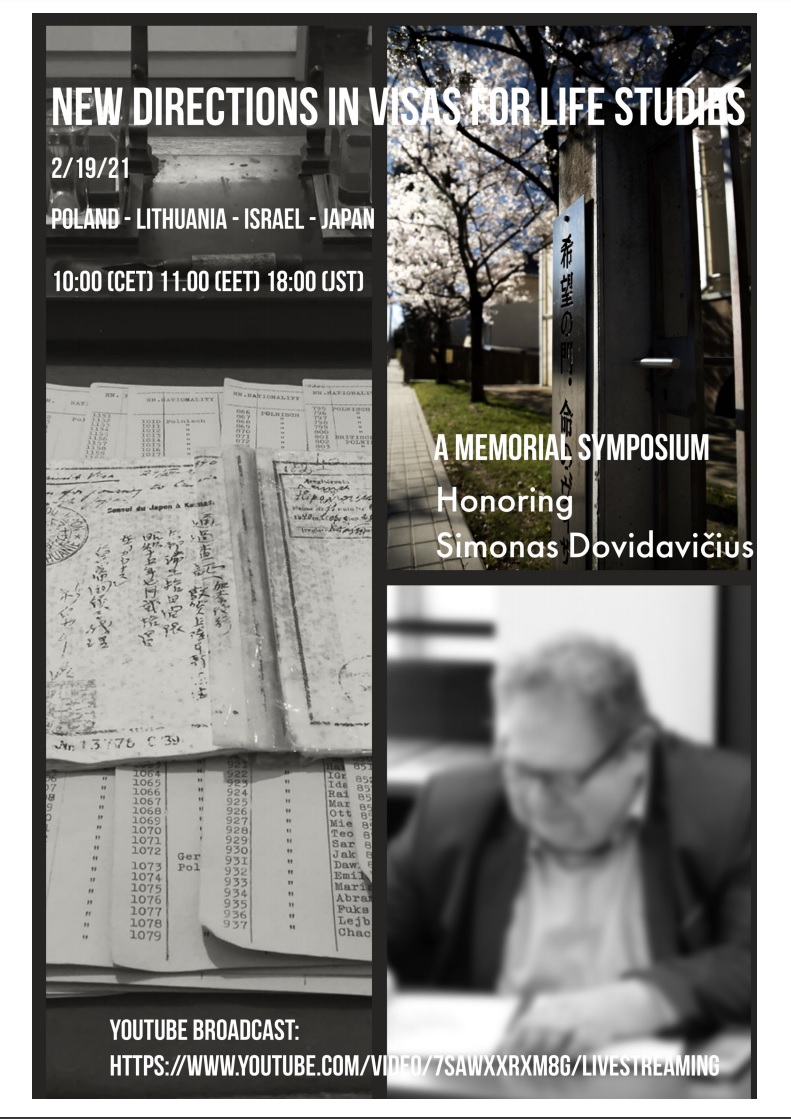
Sugihara House, maintained by Sugihara Diplomats for Life Foundation (est. 1999) has promoted the history of Visas for Life for many years. The knowledge of the act of humanity - issuing the visas for Jews, mainly Poles who were escaping from totalitarian regimes in 1940 by Chiune Sugihara, the Japanese consul in Kaunas, accompanied by Jan Zwartendijk, Dutch Honorary Consul in Kaunas, Lithuania was a humanitarian act, which is remembered until today in many countries. The exposition, “Visas for Life,” presents unique moments of Chiune Sugihara and Jan Zwratendijk’s life, stories of those who were rescued by them is greatly enriched by documents long preserved: photographs and passports from the personal archives of survivors’ families. In recent years numerous researchers continue the archive queries, developing the story of the humanity chain, created by ordinary people and diplomats, including Tadeusz Romer, who helped the refugees to reach the safe destination, escaping from totalitarianism and death. In their research they also mention an important role of Sugihara and his legacy - building a bridge between Japan and other countries.
Simonas Dovidavičius, the previous director of the Sugihara House, encouraged many researchers to continue and present their research in this institution. The online event will honor Simonas Dovidavičius legacy, examining the new directions in Visas for Life research. Dovidavičius was always willing to develop and promote the knowledge about the Japanese consul Sugihara, Dutch Honorary Consul Zwartendijk and the refugees, who escaped from Nazi and Soviet occupied Europe and found help in Japan and then in Shanghai or another countries. Simonas Dovidavičius passed away on the 14th of December 2019.
New Directions in Visas for Life Studies – A Memorial Symposium Honoring Simonas Dovidavičius
Friday, February 19, 2021
10.00 – 12:00 (CET)
11:00 - 13:00 (EET)
18.00 – 20.00 JST (JST)
- The event will be held as an online webinar in Zoom and requires prior registration https://forms.gle/JHCWAnKBauUjRyKMA by 15:00 (EET) Tuesday, February 15.
- Direct contact (no registration - registration is possible only via the form given above)
- The language of the symposium is English.
- YouTube broadcast: https://www.youtube.com/video/7SAWXxRxm8g/livestreaming
Program:
Welcome speech to New Directions in Visas for Life Studies: A Memorial Symposium Honoring Simonas Dovidavičius, Ramūnas Janulaitis, Sugihara House Director and Ramūnas Garbaravičius, Chairman of the Board.
Welcome remarks by
His excellency the Ambassador of Japan to Lithuania, Shiro Yamasaki
His excellency the Ambassador of the United States to Lithuania, Robert S. Gilchrist
His excellency the Ambassador of Lithuania to Japan, Gediminas Varvuolis
The Director of the Polish Institute in Japan, Ms. Maria Żurawska
Moderated discussion with the participation of:
Prof. Egidijus Aleksandravičius, Vytautas Magnus University, Lithuania
Prof. Chiharu Inaba, Meijo University, Japan
Prof. Rotem Kowner, Haifa University, Israel
Prof. Andrzej Pukszto, Vytautas Magnus University, Lithuania
Dr. Olga Barbasiewicz, Jagiellonian University, Poland
Dr. Simonas Jazavita, Vytautas Magnus University, Lithuania
Dr. Martyna Rusiniak-Karwat, Pilecki Institute, Polish Academy of Sciences, Poland
Dr. Simonas Strelcovas, Vilnius University, Lithuania
Dr. Linas Venclauskas, Sugihara Diplomats for Life Foundation, Vytautas Magnus University, Lithuania
Marcin Łapczyński, Minister's Counsellor, Ministry of Culture and National Heritage, Poland
Akinori Nishikawa, Port of Humanity Tsuruga Museum, Japan
Akira Kitade, journalist, Japan
Closing remarks
Organizing committee:
Dr. Olga Barbasiewicz, Jagiellonian University, Poland
Dr. Simonas Strelcovas, Vilnius University, Lithuania
Dr. Linas Venclauskas, Sugihara Diplomats for Life Foundation, Vytautas Magnus University, Lithuania
Ieva Mičiulytė, Sugihara Diplomats for Life Foundation
